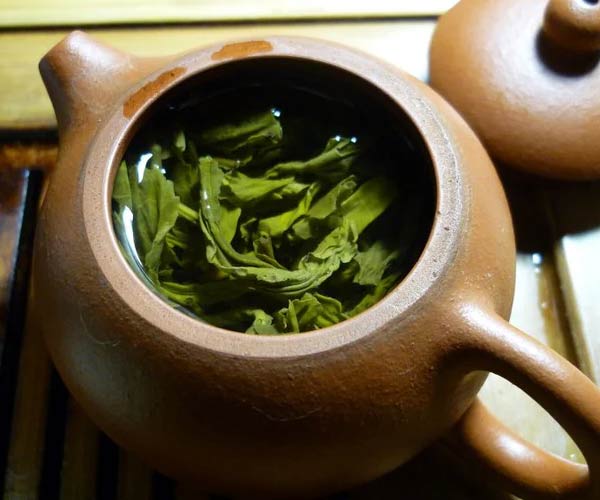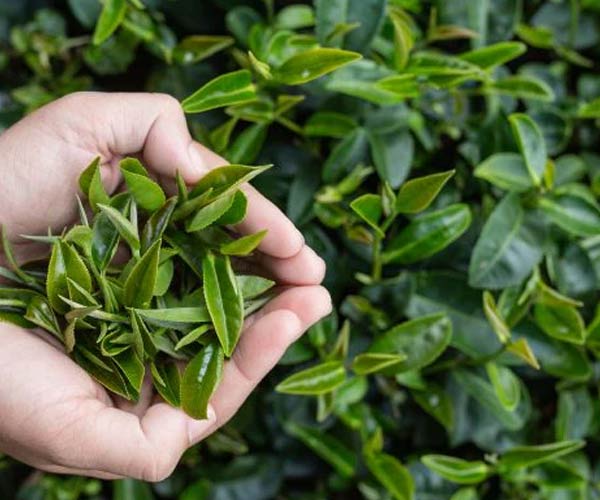How healthy is green tea really?
Anyone who delves into green tea quickly stumbles upon ambitious promises: From a stronger immune system to the prevention of serious illnesses, almost anything seems possible. But does the tea deliver on its promises—or is its positive image a bit exaggerated?
Antioxidants: The silent power of green tea
At the heart of many of the praises is the so-called EGCG (epigallocatechin gallate), a secondary plant substance from the catechin group. EGCG actually makes up a significant portion of the dry matter in green tea and, above all, has one important function: It helps the body neutralize free radicals. This antioxidant effect has long been considered a protective factor for the immune system. However, we shouldn't expect a daily cup to eliminate all of life's imponderables—the effects are measurable, but less spectacular in everyday life than many myths suggest.
The thing with vitamin C and zinc
Green tea contains small amounts of vitamin C and zinc – known immune-boosting substances. However, both substances are present in tea only in limited amounts, especially compared to other foods such as bell peppers, sea buckthorn, or meat. Furthermore, vitamin C is quite sensitive to heat: If the tea is brewed too hot, its content decreases further. Therefore, those who want to specifically meet their vitamin C needs are better off turning to other sources.
Green tea in the focus of cancer research
Research on the connection between green tea and cancer prevention is a patchwork of studies: Some studies show promising results, while others contradict them. The current scientific consensus is that green tea may reduce the risk of certain types of cancer, but there is no evidence for this. Therefore, those who drink green tea should do so primarily for enjoyment—not in the hope of a cure-all.
Fit and focused through theophylline and amino acids
An undisputed benefit of green tea is its gentle caffeine kick, which is partly due to theophylline. Combined with the amino acid L-theanine, the drink ensures an alert but not jittery state of mind – green tea actually makes you more focused without making you jittery. It's the ideal companion for concentrated afternoons or a short break from everyday life.
How much is healthy?
Green tea is worth drinking, as long as you drink the right amount. Up to five cups a day is generally considered safe. However, those who overdo it—for example, with ten cups or high-dose extracts—risk side effects such as liver damage. As with so many things, less is sometimes more.
Green tea is therefore a valuable companion for everyday life – but not a miracle cure. Those who value variety, conscious enjoyment, and the small health benefits are well advised.
Green tea and cancer: What do scientific studies say?
But what is the scientific basis for the connection between green tea and cancer? It's worth taking a look at meta-studies and the renowned Cochrane Collaboration, which have compiled numerous studies on the topic. The scientific landscape is surprisingly diverse: Some studies suggest that regular consumption of green tea or its extracts could reduce the risk of certain types of cancer. Other studies, however, find no clear connection or even indicate minimal risks.
Overall, reviews like the one from the Cochrane Collaboration paint a rather cautious picture: There is evidence of a potentially protective effect, but the data are not yet conclusive enough to recommend green tea as a reliable means of cancer prevention. Research therefore remains exciting, and further studies are needed to shed more light on the causal relationships.
How much green tea is healthy?
As with many good things in life, the same applies to green tea: it's the dose that makes the difference. For most people, three to five cups per day is a recommended amount that optimally supports the positive effects on health and well-being. However, those who enjoy more than ten cups daily may reach a limit where side effects may occur.
In particular, very high amounts of EGCG, which is found in concentrated tea extracts and dietary supplements such as those from reputable brands, can cause adverse effects in sensitive individuals—such as liver damage. However, the natural form in tea remains safe for the vast majority of people as long as they follow normal tea culture.
So pay attention to high-quality varieties, enjoy your green tea in moderation – and thus ensure a lasting benefit for body and soul.
Limits of enjoyment: What to consider when consuming excessive amounts
As impressive as the health benefits of green tea, and EGCG in particular, are, it's worth maintaining a balance. While moderate consumption—up to five cups a day, for example—is generally considered safe, larger amounts can be problematic. Research shows that overdoing it with green tea or EGCG supplements exposes you to potential risks.
Excessive intake, especially in concentrated form as a dietary supplement, can place a strain on the liver. Some studies and case reports indicate that liver damage is possible, especially in sensitive individuals or at doses exceeding ten cups of tea or high-dose EGCG supplements. Symptoms such as nausea, abdominal pain, or yellowing of the skin should be taken seriously and consult a doctor.
In short: Enjoy green tea in its natural form and with due appreciation, but leave high-dose experiments to lab mice. Moderate consumption invigorates; too much can be detrimental.
Theophylline: Energy with sensitivity
In addition to the well-known antioxidants, another ingredient in green tea deserves special attention: theophylline. This natural active ingredient, like caffeine, belongs to the so-called xanthines and has a remarkable effect on the body and heart. Unlike caffeine, theophylline's stimulating effect is particularly pronounced: It improves blood circulation, supports heart function, and can thus specifically increase energy levels.
What makes green tea so unique is the gentle balance created by L-theanine. The amino acid contained in the tea slows the onset of theophylline's effects, allowing the invigorating effect to set in slowly and evenly. The result: Instead of a quick "caffeine hit," green tea drinkers often experience clear, long-lasting focus and a sustained feeling of alertness – without any jitters or heart palpitations.
This harmonious combination makes green tea a perfect companion for those who want to combine concentration and endurance with mildness.
Theophylline vs. Caffeine: A subtle difference with a big impact
While caffeine is probably familiar to everyone as the invigorating ingredient in coffee and tea, green tea contains another exciting active ingredient: theophylline. Both substances belong to the xanthine family and provide a stimulating effect – but there are some notable differences in their effects on the body.
Theophyll works similarly to caffeine, but stimulates the cardiovascular system to a greater extent. According to research, its stimulating effect on the heart is about three times stronger than that of caffeine. This means that green tea not only gently wakes you up, but also supports the heart in a special way.
At the same time, the specific blend of theophylline, caffeine, and the amino acids contained in green tea, such as L-theanine, ensures that the stimulating effects are delayed and take effect more evenly. This creates a feeling of alert serenity and mental clarity—focused and relaxed at the same time.




Leave a comment
This site is protected by hCaptcha and the hCaptcha Privacy Policy and Terms of Service apply.